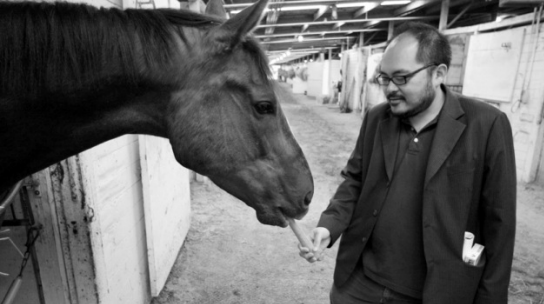Kevin Chong is a Vancouver author and has seen two books hit the shelves in the past year and a half: Beauty Plus Pity, a novel, and My Year of the Racehorse, a non-fiction work about horseracing. These books join Baroque-a-nova, Chong’s first and highly-acclaimed novel, as well as Neil Young Nation, an account of a road trip that traces the path of Neil Young. Chong also teaches creative writing at the University of British Columbia.
First of all, what’s this past year been like for you, with Beauty Plus Pity and My Year of the Racehorse?
People think I’m like Joyce Carol Oates, churning out books left, right and centre, but the truth of the matter is Beauty Plus Pity I started writing in 2002 and the racehorse book I started writing in 2009, so it sort of coincided. At one point there was discussion that both books would come out in the same season, and that would have been really crazy.
It’s still been pretty hectic, to be honest. I’ve been teaching, and I’ve also moved in with my girlfriend and her kid, and so my days have gotten really busy. It’s a lot calmer now that it’s fall.
Last year I think there was one day where I did a reading in Seattle, and then drove home and flew to Ottawa for a day, and came back here for the writers’ festival all in the same week. It was pretty amazing. But I don’t think I’m leaving the province this fall, and that’s great.
I’ve read both My Year of the Racehorse and Neil Young Nation, and it seems like you kind of approached both of them as though you felt you were faking your way into writing a book.
[Laughs.] I know how you feel. There are non-fiction writers who write about their traumatic experiences, like being ill, or surviving an accident or something like that. Well, for better or for worse—and mostly for the better—I’ve had a pretty untraumatic life.
So I guess I would consider my books as kind of non-essential books in some ways. They’re books about different interests, and writing about it in a first-person way allows me to delve into that interest, be it internet fandom and digging deeper into my teenage interest in Neil Young or horseracing. My goal is to get people who aren’t necessarily interested in horseracing or interested in Neil Young to somehow relate to my personal experiences.
I’m sure there are people who think writing from this kind of personal perspective is somewhat self-indulgent, and I can’t argue with that. At the same time, I would say that I find things I’m interested in, and talk people into letting me write books about it. Yes. That’s definitely true.
You mentioned things have slowed down now that it’s fall. Does that mean you’re working on something new?
As you were calling me, I was actually procrastinating. I’m trying to write an outline of this new novel, which I’ve written 18,000 words of.
Most people write their outline right at the beginning, but at the same time I just need to think things through, so I spent two months writing and this week I decided to write an outline for it.
So to procrastinate I’ve been playing Settlers of Catan on my iPad. I never really understood the appeal until this week, and now I’ve been playing it until, like, two in the morning. My work day involves two parts procrastination for every one part work.
I think that’s fairly normal.
[Laughs.] Oh, I hope so. And you know what, I know some really productive writers, people who write a book a year, and they only spend two or three or four hours a day. And to be honest, if you can have two or three good hours a day, you don’t need to write that much more, because that’s plenty. And if you can manage your time well, you can do a lot of dithering.
And I think it’s important to the process to be able to walk around. Sometimes you get an idea while you’re walking your dog, or in the shower, or just hanging out. And that doesn’t happen when you’re preoccupied with work and trying to cram every hour with meaningful activity. A lot of the time, fiction involves a lot of flailing.
How does living in Vancouver affect your work, and how much does that come into your work?
Vancouver influences me in a couple of ways. I’m mainly here because my family is here and I feel really connected to the city. I’ve been here almost all my life, except for when I was born in Hong Kong and went to grad school in New York.
But I went to high school here, and I run into people all the time. I really, really like that, to be honest. It’s a very comfortable place for me.
And as someone who’s of Chinese ancestry living in a city that’s a quarter Chinese, it’s really interesting to see how east meets west and west meets east – the hybridity, the cross-pollination that’s forming.
And the novel I’m trying to work on deals with someone who’s a Chinese-born Canadian who’s moving to China. I think being here allows me to explore that, to delve into that. I think if I were a Chinese-Canadian living in a city that didn’t have a large Chinese population, maybe I’d be more preoccupied with my identity in a different way.
So what’s next on your to-do list?
In some ways, I’m not sure what the next thing is on my bucket list, but I’m going to keep writing books and keep doing what I’m doing.
I feel very lucky in some ways because I have a life that I really enjoy and I like my work a lot. I know that’s not the case with everyone. It’s not 100 per cent fun, but a lot of it is.


